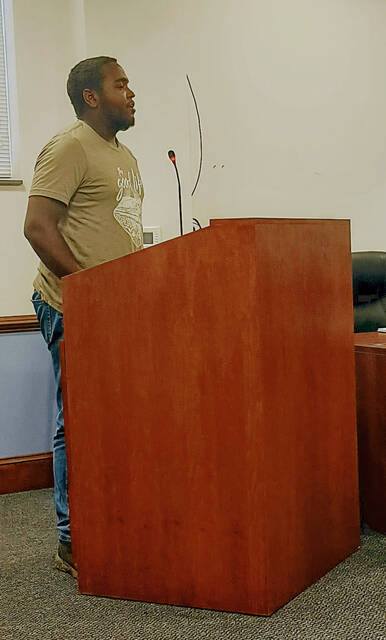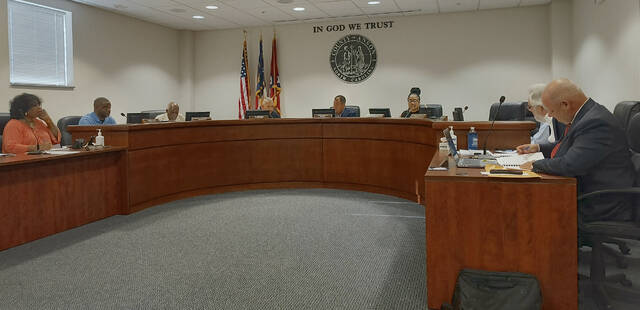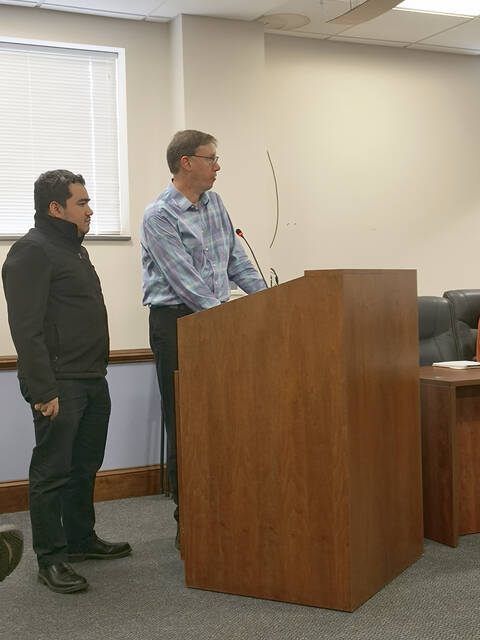WADESBORO — Since 2019, the Anson County Board of Commissioners, in conjunction with the Town Manager, Town Planner, and other county leaders, have quietly hammered out a county wide Zoning Ordinance Plan. The 254 page document outlines what county officials believe is the closest draft to date that most satisfactorily addresses current and potential zoning issues.
A well attended public hearing for citizen feedback on the zoning ordinance plan was held on Tuesday, May 6.
Public Comments
White Store resident, Laura Laney, opened discussion by stating that she supports the zoning plan as proposed, “I think it offers us equal protection, clear accountability, and transparency for all citizens in Anson County.”
Another selling point for Laney is the landscaping design incorporated into the zoning ordinance packet, though she notes, “I ask that you streamline to only include plants, trees, and shrubs that are native species. Those are designed to do well in our area, handle the climate conditions, provide the best erosion prevention and air quality. They are the best choice and require less maintenance as they are designed to thrive here.”
Laney went on to highlight a provision within the plan that has become a bone of contention for many within the community, the continued expansion of the Anson County Landfill.
“We do not need any more landfills in Anson County. I do not see any reason why there even needs to be a designation of greater than ten acres landfills or less than ten acres landfills in any area aside from high industrial, where the one is already designated.”
Echoing a familiar refrain, Laney summed up, “I just don’t want Anson County to become a landfill.”
Speaking several times throughout the evening, Laney added another concern shared by many with a seemingly reasonable solution, ”Based on the last commissioner meeting it seems the zoning process is an internal review committee and because this document charges you, as the Board of Commissioners, with administering the zoning ordinance if it passes, I would just ask that you consider reworking that to be more of a citizen based board with at least three members, with term limits, and clear documentation that people would recuse themselves if there were any conflict of interest.”
Polkton resident, and outspoken critic of Waste Connections, Charles McGinnis addressed commissioners next, stating, “This zoning document is allowing companies and corporations to legally bring hazardous waste, of all types, putting our health, quality of life, and safety at risk.”
McGinnis suggests the best way for the zoning document to prevent these hazardous ills is to add exclusionary zoning ordinances that forbid human and toxic waste from being processed and stored in Anson County.
“If this zoning document is approved in its current form, we will face a challenging future. Recent news articles have indicated that the lithium mining project in Gaston County is still progressing. There is a potential for another lithium mining project in the Badin area,” said McGinnis.
Having previously witnessed the scourge of progress on a small town community, Texas transplant, Christopher Borgstede, addressed commissioners and his fellow neighbors with a warning.
“When any kind of change requires everybody in the county to agree that that change is good, you don’t get change.”
Borgstede claims that instead of change, citizens end up descended upon by Land Bankers or the modern day carpet-bagger, who, according to Borgstede’s experience, “Buy up the commercial space, buy up other stuff, but they let it rot. Once necessity arrives, then they come in and develop. They push it through the zoning board and woo its members.”
Detailing how small towns find themselves swallowed alive by coporate development, Borgstede went on to share the effect zoning had on his home state, “Right now Austin [TX] has a homelessness problem, 10,000 people and rising. Charlotte is not too far behind and in Charlotte you cannot change the zoning without putting out big placards and facing the opposition, so the only people who do it are the ones that can actually weather the opposition, the big developers.”
Bleakly summing up, Borgstede added, “Your kids, your families, they can’t face down the opposition that they get. The outcome is no economic growth, the kids move away, and the county dies. All that is left are the people that can’t escape…. Until all that is owned here is by corporate.”
Speaking next, Otis Rodgers Jr. stated, “One of the main things that we talked about last year is that it [Zoning Plan] discourages and stifles small businesses. A lot of small businesses start in rural areas… What we find is that many of these rural-based businesses have to get a special use permit, go to the Board of Adjusters or commissioners for approval, and it just seems to me like the government is trying to get into my life.”
Backing up his neighbors, Rodgers echoed, “There are things in this particular zoning [plan] that to me do not make sense. With the landfill, again, that is a major issue and it’s like that as a board it was not paid attention to. We told you the same thing last time, last year and we are saying the same thing again. A landfill can go into a RA5 and other rural districts, housing districts? That makes no sense. I don’t know if Waste Connections is part of any of these boards here but it makes no sense. We already know about the foul smells, the heavy truck traffic, and for the last several weeks we have been talking about a flea market, but this is just as bad.”
Rodgers spoke to an issue facing rural communities, “There are a lot of reports of investigative judgement on chicken farms and it is as if everybody keeps their eyes and ears closed. We see all the reports from the eastern parts of our state about what pig farms do and how it destroys communities. If I have a chicken farm next to me, my land value is going to go down.”
Expecting county leaders to work from the 2005 zoning framework as a base, and community feedback from the intervening years to draft a zoning plan, Rodgers expressed his frustration, stating, “We need to get this right. With all due respect, this current zoning plan is not right. On page 65 where it talks about the landfill, go back and look at it.”
Elijah Rodgers took umbrage with the zoning plan prohibiting businesses such as small electronic repair shops, printing shops and offices.
“I think we should have an option… I don’t think it should just be flat out not allowed. I do not think a landfill should be allowed when a printing shop is completely not allowed.”
A supporter of the plan, Lee Little declared to commissioners, “We need this radically.”
Turning to face his fellow citizens, Little explained, “We shouldn’t be afraid of things that haven’t happened yet because we have lost 15% of our population. What is happening is that we are having a collapse both in the economic future of our county and in the demographics.”
Determining the zoning plan to be the citizens only recourse to sustaining a voice in the direction of county growth, Little expounded, “If we are going to help ourselves and help our future generations, we need the certainty, structure, and due process to appeal anything that we don’t like today about the proposed zoning plan. The only way we move forward, is not by denying it but by embracing it, entering into a future with change and a structure so that people from the outside can view us as a mature, responsible partner to any development that can happen… We are dying on the vine here.”
Agreeing with Laney, Art Taylor suggested, “The other thing that I think we need is a Planning Commission and Zoning Board. We don’t need one man making all the decisions. This one man has too much power and we need to have joint decisions made.”
Carlene Rodgers, a budding entrepreneur in the community, fears her dreams will be stamped out by what she views as restrictive parameters outlined in the plan for small businesses.
Speaking in favor of zoning, John Sikes stated, “In the Burnsville area we have two shooting ranges that have come up and we have heard talk of another. We have a rodeo that has come in, we have had several things that have come into the community that the community is very concerned about. We have no voice now. This will give us a voice and we need a voice in the county. This will give us a say in what comes to our community and how it is dealt with.”
Discussion
Present at the public hearing was Jeff Young who drafted the zoning plan. Called to the podium by Commissioner JD Bricken, Young was asked to explain to citizens provisions within the plan related to small businesses and rural zoning.
“A majority of what is in the ordinance is a result of that extensive process that you went through a few years ago,” Young explained.
He went on to share that when he met with [County Tax Assessor and County Planner] Larry Newton and [County Manager] Lenn Sossaman, concerns over home based businesses or occupations were discussed, and attempted to be provided for in the zoning ordinance.
“I researched this and made provisions for home occupations and for what we have referred to as rural, home-based businesses.”
Young added that from his experience, “I don’t know of any zoning ordinance anywhere that has stayed like it was when it was first adopted for very long.”
Young stated, “The future holds endless opportunities to make changes, update, and make it fit better for the community.”
While opportunities may be endless, funds may not, and a fee will be charged to every citizen wishing to propose a change to the zoning ordinance. This factor, loudly left largely unmentioned, is how much a citizen will be asked to pay in order to request desired changes to the ordinance, or what factors will be considered by commissioners when they annually vote to determine the fee amount.
Offering insight, Bricken interjected, “One reason why zoning has taken longer than we wish it had, is because the previous contractors that we had paid to consult with us on zoning were not interested in giving us these home occupations in these rural businesses.”
Citing Carlene Rodgers and her dream of a future home bakery or store, Bricken added, “It [bakery] would certainly be allowed. With what we have here not only would we allow it, I would say that we would want to promote it. I think that maybe we are going in a different direction than some people may think that we are.”
He further pointed out that the ordinance defines home businesses and occupations, or what some states term “cottage industry,” as well as provide stipulations for how many employees, or working, contributing family members, are allowed for the small business.
Championing citizen concern, Commissioner Priscilla Little-Reed challenged Young to expound on officials’ reasoning for earmarking provisions within the docment for additional landfills.
“The state takes a primary role in regulating environmental issues. Landfills are not done without a state permit, which is a fairly long and involved process,” he explained.
Referencing an example put forth by a DOT official that road projects gain approval, Young said, “The same thing is true of any facility that stores, transfers, and transports any kind of hazardous material. Any new landfill will have to go through both the state and local process.”
Acknowledging the concern is shared by many, Young continued, “Obviously this is an issue that we are all concerned about. The standards that are in the ordinance as it is drafted now, can become more or less stringent over time according to what citizens and elected officials want to do with it.”
Chairman Jamie Caudle added, “Their (Waste Management) contract specifically states no hazardous waste, no toxic waste allowed. Zoning does not override their contract.”
Caudle shared that another component of Waste Management’s contract with the county, is that there will be no other landfills in Anson County.
“In other words they are the monopoly of landfills in Anson County. No matter if it is allowed on a ten-acre site or not, Waste Connections will not allow it, according to their contract.”
Caudle’s words drew rumblings from the crowd, with many surmising that if provided for in the zoning ordinance, then Waste Management will be free to expand its ever sprawling landfill into zoned areas. With the landfill located minutes from downtown Polkton, provided citizen feedback indicates residents are seemingly less concerned by Waste Connections facing a potential competitor, as they are that Waste Connnections will continue its slow expansion, and entrenchment, into their community.
Speaking to an earlier shared concern, Bricken added, “The contract currently does not allow lithium in Waste Connection’s landfill in Anson County.”
Also wishing to address a concern mentioned by the public, Caudle asked why Anson County cannot prohibit poultry farms from moving into the area.
County Attorney, Scott Forbes, answered, “The state has preempted us from being able to regulate that and they also identify what a farm is.”
At the behest of Sossaman, Young outlined, “Any owner of a piece of property, or even someone who is not an owner, can request a zoning change. The process for that is the same for everyone. There is an application, a public hearing and a vote.”
Addressing Young from his seat in the audience, McGinnis questioned, “What provisions are in the zoning ordinance to protect us from the McGill Corporation?”
A waste processing plant that, in very layman terms, seeks to convert bad smells into profitable methane stores, McGill has previously been granted approval by the Board of Commissioners to open a renewable natural gas facility down the road from the landfill in Polkton.
Refusing to wade into the issue of methane, Young did offer assurance that, “There are more opportunities to get face to face with a developer of a facility like that in this forum once you have the zoning ordinance.”
Seeking to allay concern, Caudle asked Young hypothetically, “If a business is not listed as prohibited in the ordinance, would it mean that business could then just set up shop somewhere in the county? “
“No,” answered Young. Adding, “Though on the flip side, for example, a burger restaurant might be allowed by the zoning ordinance, but maybe it doesn’t say a hot dog restaurant is allowed. It is a fairly easy decision to say that a hot dog shop is permitted, because it is essentially the same. There does have to be room for interpretation within the zoning ordinance, which it does permit.”
Many attendees questioned why perimeters are set against typical homesteading duties such as operating a greenhouse, seed production, and the operation of a saw to cut logs on one’s property.
‘The reason we have stipulations there,” Caudle explained, “Is because in your mind you are going to open a greenhouse, a small, private, maybe family-run business. If we don’t spell that out, you could have the largest seed and fertilizer dealer right beside you that is operating two hundred trucks a day. We couldn’t regulate that because we didn’t spell it out.”
Speaking from the crowd, one woman demanded “If you are going to regulate things that are of concern to citizens, why not deal with it now? Lets just say that on landfills, lets get rid of them or not even have the option available for a RA5 residential community.”
Chairman Caudle responded, “We have to start somewhere. If we make that decision tonight, then we have to advertise for another public hearing thirty days from now. I can promise you that in thirty days someone else will have a concern they need changed and it is a never ending cycle where zoning never happens. We will address, I assure you, the landfill going forward in RA districts.”
Backing up the Chairman, Bricken added, “We are the only county in central North Carolina without county wide zoning and I don’t see where it has done us a whole lot of good. We have things that y’all are concerned about out there, that came because we do not have county wide zoning, and that zeroes everybody in on us.”
Sharing his thoughts, Commissioner Jarvis Woodburn stated, “With zoning in place, concerns will be known up front and the concerns can be answered at that time, rather than after the fact. I see the necessity for having zoning in place because if you look at a map of North Carolina, and if you include South Carolina, we are the only county, and it stands out, that does not have zoning. Just because this is adopted, it does not mean that it is set in concrete.”
Woodburn confided that from his experience working with the Planing Board, “As a rule they will usually approve or refer the matter to commissioners.”
The Vote
At Caudle’s request, Commissioner Lawrence Gatewood proposed, “Mr. Chairman, I make a motion to approve the county wide zoning plan.”
Seconded by Woodburn, the motion entered into a vote without any further discussion on the matter.
By a show of hands, Commissioners’ Robert Mims, Jarvis Woodburn, JD Bricken, Jamie Caudle, Priscilla Little-Reed and Lawrence Gatewood all voted in favor of passing the zoning ordinance, officially adopting a county wide zoning plan for Anson County. Commissioner Smith was not present for the proceedings.

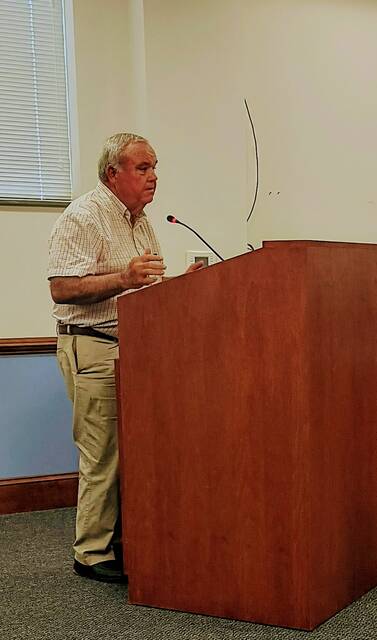
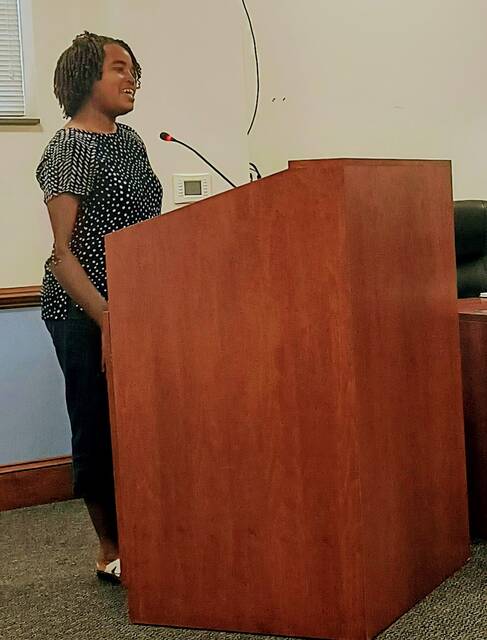




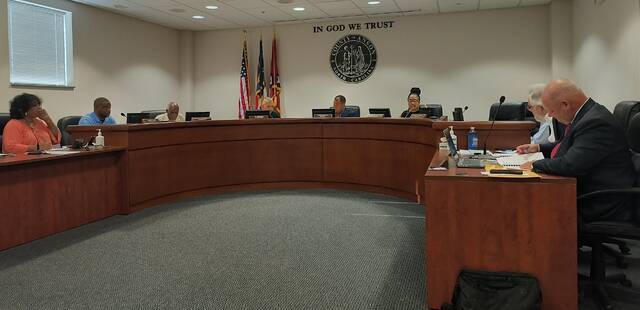

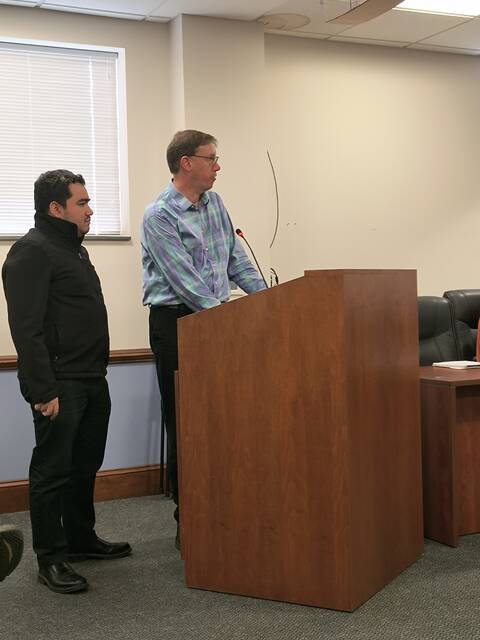

![<p>Otis Rodgers Jr. stated, “One of the main things that we talked about last year is that it [Zoning Plan] discourages and stifles small businesses. A lot of small businesses start in rural areas… What we find is that many of these rural-based businesses have to get a special use permit, go to the Board of Adjusters or commissioners for approval, and it just seems to me like the government is trying to get into my life.”</p>
<p>Lauren Monica | Anson Record</p>](https://ansonrecord.com/wp-content/uploads/2024/05/130605382_web1_converted_663fb62cdb91a.jpg)


